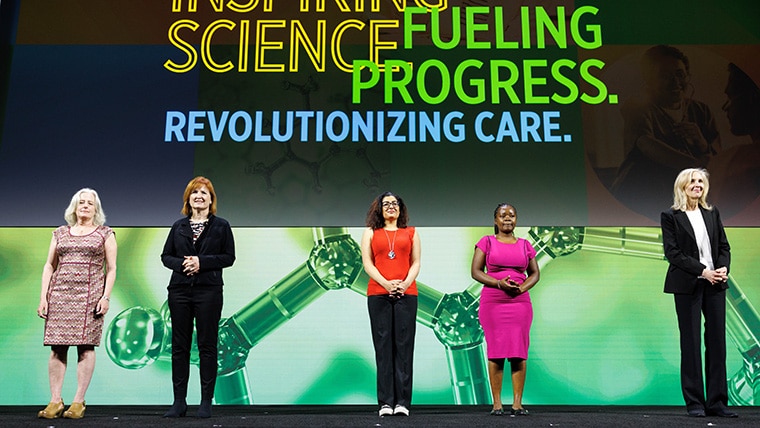The Power of Journalism: The 2024 AACR June L. Biedler Prize Winners
A patient finding hope in a clinical trial for a KRAS-targeted therapy after years of having little progress with other treatments.
Exposing how more than 90 countries around the world—many of them low- and middle-income nations—were being sent a poor-quality version of a key chemotherapy drug for the treatment of children with acute lymphoblastic leukemia (ALL).
Two breast cancer survivors expressing their frustration with a change in medical insurance codes being the barrier to getting the breast reconstruction surgery they preferred.
Examining why 4,310 women in the United States were estimated to die of cervical cancer in 2023, despite having effective screening techniques and a vaccine that can help prevent it.
A family learning the hard way—like many others—about the hereditary risks of cancer and the importance of getting genetically tested.
A pregnant woman thinking a blood test would tell her more about her baby, only to learn she had cancer.
All these stories were told by journalists who exemplify the role the media can play in raising awareness about key issues related to cancer and cancer research. They uncovered hard truths, helped spread the inspiring stories of cancer survivors, and may have even changed how some people think about cancer. That is why they were honored by the American Association for Cancer Research (AACR) with this year’s AACR June L. Biedler Prize for Cancer Journalism at the AACR Annual Meeting 2024.

June L. Biedler, PhD, was a cancer research pioneer who believed science communication is critical to the fight against cancer. After the AACR received a sizable grant from her estate following her death in 2012, the organization established this award in 2015 in her honor.
This year, five winners were selected in four categories from submissions that spanned 19 countries.
Magazine
“Why Is Cervical Cancer Still Killing Thousands of Women a Year?” by Beth Howard of Prevention was part of the magazine’s “Year of Making Noise” series dedicated to examining overlooked health issues and helping people affected by these issues speak up. Howard ponders how her titular question could still be the case considering Pap smears are an effective screening method and the HPV vaccine offers near 100% protection against cervical cancer.
She recounts stories like those of Kate Weissman, a patient overlooked by her doctors even when she had Pap smears with abnormal results. And Black patients like Tiera Wade who felt shamed by her doctor based on false assumptions about her sex life and discovered a white friend who would get reminders for appointments that she never got. Howard also speaks with experts about vaccine hesitancy, misperceptions about screening guidelines, and more as she searched for her answer.
Newspaper
In “New Drug Promises Better Treatment for Cancer Patients” by Hellen Shikanda of Daily Nation, Shikanda tells the story of Alex—a pseudonym to maintain the patient’s privacy—who at 64 was informed by his doctor that the cancer markers in his body had increased compared to his previous blood tests. From that moment, he embarked on a journey through at least five countries as various doctors tried to first diagnose his cancer and then treat it once it was determined he had stage 4 colon cancer that had metastasized to his liver. While 11 rounds of chemotherapy left no traces of cancer in the colon or liver on scans, doctors still recommended maintenance chemotherapy considering the cancer markers in his blood remained high.
This maintenance chemotherapy kept his cancer stable, but he wasn’t improving, and Alex was left exhausted by the side effects. A new genetic test found he had a KRAS G12C mutated gene, which provided Alex with a new opportunity. A phase 1b clinical trial was evaluating a drug targeting KRAS G12C in colon cancer patients after it had received approval as a treatment for adult patients with non-small cell lung cancer. This trial is one part of a global study to see whether this treatment can be effective in various cancer types and give more patients whose tumors have a KRAS G12C mutation new hope.
Online/Multimedia
“The Drug was Meant to Save Children’s Lives. Instead, They’re Dying.” by Rosa Furneaux and Laura Margottini of The Bureau of Investigative Journalism uncover a startling truth about the quality of asparaginase—a treatment for children with ALL—being used in many low- and middle-income nations. Because many of these nations don’t have thorough quality control infrastructure in place, researchers and doctors are finding the asparaginase they are being sent is contaminated with bacteria or other byproducts that cause side effects or lessen the effectiveness of treatment.
One researcher they speak with found that survival rates for patients being treated with asparaginase produced in India was similar to those receiving no asparaginase at all—this was a stark difference compared to the survival rates of those receiving the gold-standard brand of asparaginase used in higher-resource countries. Experts estimated this could be putting 70,000 children at risk.
Furneaux and Margottini look into why potentially contaminated drugs are still being shipped to these countries and what steps some doctors are taking as possible solutions.
Television/Radio/Podcast
Nell Greenfieldboyce of National Public Radio (NPR) is being recognized for her work on two pieces related to genetic testing: “A new kind of blood test can screen for many cancers — as some pregnant people learn” and “Testing your genes for cancer risk is way cheaper now — and it could save your life.”
In one, she relays the story of Kathleen Aukstikalnis, a first-time pregnant woman who took a prenatal blood test to find out her baby’s sex and look for any chromosomal abnormalities. When the results kept coming back inconclusive, she learned it may be because she has cancer. Eventually, she joined the clinical trial IDENTIFY, which is examining other pregnant women with similar results to try to discover what exactly causes these inconclusive findings. Ultimately, the researchers determined Aukstikalnis had lymphoma, which she started treatment for while pregnant and was able to deliver a healthy baby girl. Further, Greenfieldboyce looks at how Aukstikalnis’s story relates to the development of other blood tests capable of screening for multiple types of cancer.
In the other piece, Greenfieldboyce speaks with a father, Junius Nottingham Jr., who recently lost his son and implores others to get genetically tested for cancer so they may be able to avoid a similar fate. When his son, Jeremy, was diagnosed with stage 4 colon cancer at 28-years-old, everyone in the family was stunned. The diagnosis prompted doctors to recommend his family get tested for Lynch syndrome, an inherited condition with an increased risk of developing certain cancers. Junius was found to have Lynch syndrome as well as colon cancer—but while his case was caught early enough to be treated, Jeremy was not so lucky. Since his son’s death, Junius has become an advocate for genetic testing and raising awareness about the hereditary risk of cancer.
Anna Werner and Leigh Ann Winick also won in this category for “New Policy May Limit Breast Cancer Coverage” on CBS Mornings/CBS News. The correspondent and her producer, respectively, examined the Centers for Medicare & Medicaid Services’ (CMS) change of the medical billing code for deep inferior epigastric perforator (DIEP) flap procedure, which left many women without the option of getting this type of breast cancer reconstruction surgery.
The change meant surgeons wouldn’t get reimbursed as much for this surgery that uses fat, tissue, and blood vessels from the stomach to create what many women feel is a more natural option compared to silicone implants. Whether it was hearing the stories of Rita Davis or Kate Getz—two breast cancer survivors pushing for the DIEP flap procedure—or something else, CMS eventually chose to reverse course and move the surgery back to the code that allows for higher reimbursement.
“These talented journalists help advance the AACR’s mission by serving as a vital source of accurate data and other information for cancer patients, survivors, caregivers, and the public at large, and their important work helps to strengthen public trust in science,” Clifton Leaf, adjunct professor of journalism at Columbia University, former editor-in-chief of FORTUNE, and cochair of the judging panel for the AACR June L. Biedler Prize for Cancer Journalism, said during the Opening Ceremony at the AACR Annual Meeting 2024.
The winners were also honored during a reception on Sunday night.



